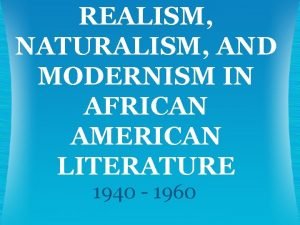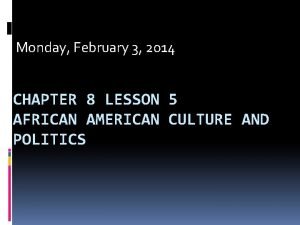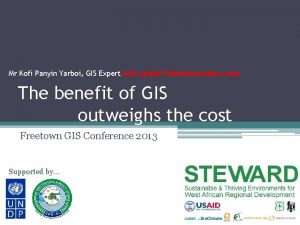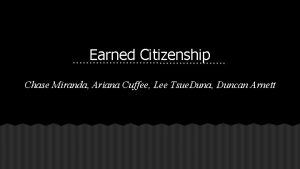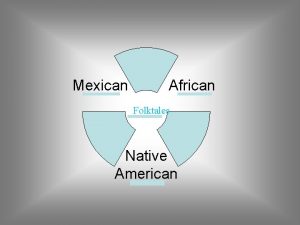AFRICAN AMERICAN ENTREPENEUR Paul Cuffee Kofi Paul Slocum










- Slides: 10

AFRICAN AMERICAN ENTREPENEUR

§ Paul Cuffee (Kofi)/ Paul Slocum Born: Cuttyhunk Island Massachusetts Jan. 17, 1759 Died: Sept. 7, 1817 Thesis Statement § Paul Cuffee was the first African American entrepreneur who advocated the ‘Back to Africa’ movement.

AN AFRICAN AMERICAN ENTREPRENEUR § Paul dropped the last name Slocum and adapted his fathers’ first name, changing the spelling from Kofi to Cuffee. The editors of Encyclopedia Britannica, an online source, admits he was a Quaker businessman, sea captain, preacher, patriot, and abolitionist. During his lifetime, he was one of the most influential African Americans in the world. He was then deemed the wealthiest African American of his time. Cuffee even taught his children to read and write. Cuffee also offered to help pay for the first public school in Westport. Thus, opening the first integrated school in America Paul began to get involved in politics around the age of 20

§ Later during the Revolutionary War his ship was captured by the British and imprisoned for three months. After he was released he built his own vessel and became a blockade runner. Cuffee set to make his own successful business. Soon he and his brother-in-law opened a shipyard in New Bedford to sell the goods he imported. Over time Cuffee built larger vessels, and eventually his hard work paid off and he became a very successful ship owner. A year later Cuffee was seized on charges that broke the 1807 Embargo Act, which restricted imports from Great Britain. May 2, 1812, he went to meet with Secretary of the Tresury Albert Gallatin and Madison demanded all his goods be returned to him.

POLITICS § In 1770 s Paul and his brother-in-law refused to pay taxes because they were denied the right to vote. Cuffee and his brother-in-law went to jail briefly. After their release Cuffee and other free blacks petitioned the Massachusetts general court. The petitioners requested that they be exempt from taxation because they were not allowed the benefits of citizenship. § The ruling was all free persons of color are liable to taxation per ratio established for white men and giving them the rights belonging to the other citizens. Subsequently he and his brother-in-law won the right to vote in Massachusetts for landowning people of color.

§ Paul Cuffee became a member of the Society of Friends also known as The Quakers. Later that year he joined The Friends Meeting in Westport Massachusetts, where he purchased a farm in 1808. The Quaker Society requested cuffees’ help on the resettlement of free blacks to the British colony, Sierra Leone. § As Cuffee accepted this quest he became very intrigued in the possibility of freed slaves’ returning to Africa. (Sheldon H. Harris, Paul Cuffe, Black America and the African Return) believes he was inspired by the British abolitionists who had established Sierre Leone. In 1811 he founded The Friendly Society of Sierra Leone and occasionally sailed there. Also in 1811 he also wrote memoir of Captain Paul Cuffee.

§ Sometime later he journeyed to England to meet with British abolitionists. Cuffee was given a land grant for his resettlement plan. A year later Cuffee was seized on charges that broke the 1807 Embargo Act, which restricted imports from Great Britain. May 2, 1812, he went to meet with Secretary of the Tresury Albert Gallatin and Madison.

§ However, In 1817 Paul began to fall ill. He never went back to Sierra Leone. He died on September 7, 1817 at the age of 58 in Westport Massachusetts. His final words were “Let me pass quietly away”. § He left an estate with a value worth approximately twenty-thousand dollars. His will provided for his widow, siblings children, grandchildren and the Friends meeting house in Westport. After Cuffee passed away the ‘Back to Africa’ movement lost a substantial amount of support. One online source mentions “Many said the ‘Back to Africa’ movement ended with his death. ” (Henry Louis Gates jr. “Who lead the first Back-to-Africa Effort? ”)


§ Paul Cuffee. Digital image. Https: //en. wikipedia. org/wiki/Paul_Cuffee. N. p. , n. d. Web. 9 Nov. 2016. § Paul Cuffee. Digital image. Http: //www. pbs. org/wnet/african-americans-many-rivers-to- cross/history/who-led-the-1 st-back-to-africa-effort/. N. p. , n. d. Web. 9 Nov. 2016.
 Christine slocum
Christine slocum Slocum fleet mission control
Slocum fleet mission control Plc
Plc Jonathan slocum
Jonathan slocum Liam kofi bright
Liam kofi bright Realism naturalism modernism in african american literature
Realism naturalism modernism in african american literature African american fighter pilots
African american fighter pilots African american english teacher
African american english teacher Prentice hall african american history
Prentice hall african american history African american cinema history
African american cinema history Chapter 8 lesson 5 african american culture and politics
Chapter 8 lesson 5 african american culture and politics





